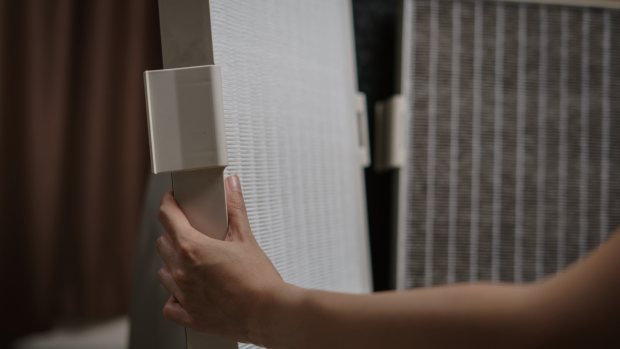- Wildfires and Indoor Air Quality: 5 Ways to Protect Your Home
- The Impact of the Palisades Wildfires & How FilterTime is Committed to Improving Air Quality and Helping Affected Communities
- How to Reduce Indoor Air Pollution During Home Renovations
- Seasonal Air Filter Guide: How to Choose the Best Filter for Each Season
- Top 10 Air Filter Maintenance Mistakes Homeowners Make

The Ultimate Guide to HEPA Air Filters: Do They Really Work?
When it comes to maintaining indoor air quality, especially in today’s world where air pollution and allergens are a growing concern, the term HEPA air filters frequently pops up. But what exactly are HEPA filters, and do they really work as well as advertised? In this ultimate guide, we’ll dive deep into the science, functionality, and effectiveness of HEPA air filters.
What is a HEPA Filter?
HEPA stands for High-Efficiency Particulate Air. To be classified as a true HEPA filter, a filter must meet specific standards set by the U.S. Department of Energy. These standards require the filter to capture at least 99.97% of particles that are 0.3 microns in diameter. The 0.3-micron size is referred to as the most penetrating particle size (MPPS), meaning it is the hardest size particle for a filter to capture. If a filter can capture particles of this size efficiently, it can likely capture larger and smaller particles even more effectively.
How Do HEPA Filters Work?
HEPA filters use a combination of three mechanisms to capture particles:
- Interception: Particles follow the air stream and come close enough to a fiber in the filter that they adhere to it.
- Impaction: Larger particles can’t navigate the bends in the fibrous material of the filter, causing them to collide with a fiber and stick.
- Diffusion: Smaller particles move erratically and are more likely to hit and stick to the fibers as they pass through the filter.
These mechanisms enable HEPA filters to capture a wide range of particle sizes, making them incredibly effective at trapping dust, pollen, mold, bacteria, and even some viruses.
The Effectiveness of HEPA Filters
Scientific Backing
Numerous studies have demonstrated the effectiveness of HEPA filters in improving indoor air quality. For instance, research published in the journal Indoor Air found that HEPA filters could reduce particulate matter by 55% to 95% in homes, significantly improving the air quality. Another study from Environmental Health Perspectives noted that using HEPA filters in schools reduced the incidence of asthma and respiratory issues among children.
Real-World Applications
HEPA filters are used in a variety of settings beyond residential homes:
- Healthcare Facilities: Hospitals and clinics utilize HEPA filters in critical areas to maintain sterile environments and prevent the spread of airborne infections.
- Airplanes: The air filtration systems in commercial aircraft often include HEPA filters to ensure passengers breathe cleaner air during flights.
- Industrial Settings: Many industries that deal with hazardous materials rely on HEPA filters to protect workers from exposure to harmful particles.
Limitations of HEPA Filters
While HEPA filters are highly effective, they do have some limitations:
- No Removal of Gases and Odors: HEPA filters are designed to trap solid particles but do not capture gases or odors. For these, an activated carbon filter is required.
- Airflow Restriction: The dense filtration medium in HEPA filters can restrict airflow, which might reduce the efficiency of heating and cooling systems if not properly maintained.
- Maintenance: Regular replacement of HEPA filters is essential to maintain their effectiveness. Over time, the filter becomes clogged with particles, reducing airflow and filtration efficiency.
Do HEPA Filters Really Work?
The short answer is yes, HEPA filters work exceptionally well for removing particulate matter from the air. However, their effectiveness can vary depending on factors such as:
- Proper Installation: For optimal performance, HEPA filters must be correctly installed in a sealed environment to prevent air bypass.
- Maintenance: Regularly changing or cleaning the filter is crucial to ensure it continues to perform efficiently.
- Complementary Systems: Using HEPA filters alongside other air purification technologies, like activated carbon filters and UV-C light, can enhance overall air quality by addressing particles, gases, and biological contaminants.
HEPA Filters In Use
HEPA Filters are too restrictive for residential use. The highest recommended MERV rating for homeowners in their HVAC system should be a MERV 13. An air purifier with HEPA filters plus using a MERV 13 in an HVAC system should be a great combination for the cleanest indoor air.
- HEPA Certification: Ensure the filter meets true HEPA standards, capturing at least 99.97% of 0.3-micron particles.
- Size and Compatibility: Not for residential use. For business and commercial use cases, the HEPA filter should fit your existing system or air purifier.
- Replacement Frequency: Check the manufacturer’s recommendations for how often the filter should be replaced.
- Additional Features: Some HEPA filters come with added features like antimicrobial treatments or pre-filters to extend the life of the main filter.
Conclusion
HEPA air filters are a proven, reliable technology for improving indoor air quality by effectively removing particulate matter from the air. Their widespread use in various settings, from homes to hospitals, underscores their effectiveness. However, for optimal performance, they should be used correctly and maintained regularly. While they don't eliminate gases or odors, they remain a cornerstone of air purification systems, especially when used in combination with other technologies.
By understanding how HEPA filters work and their benefits and limitations, you can make an informed decision about whether they are the right choice for your air quality needs. Whether for reducing allergens, improving respiratory health, or creating a cleaner indoor environment, HEPA filters are a powerful tool in the quest for better air quality.
« Back to News





